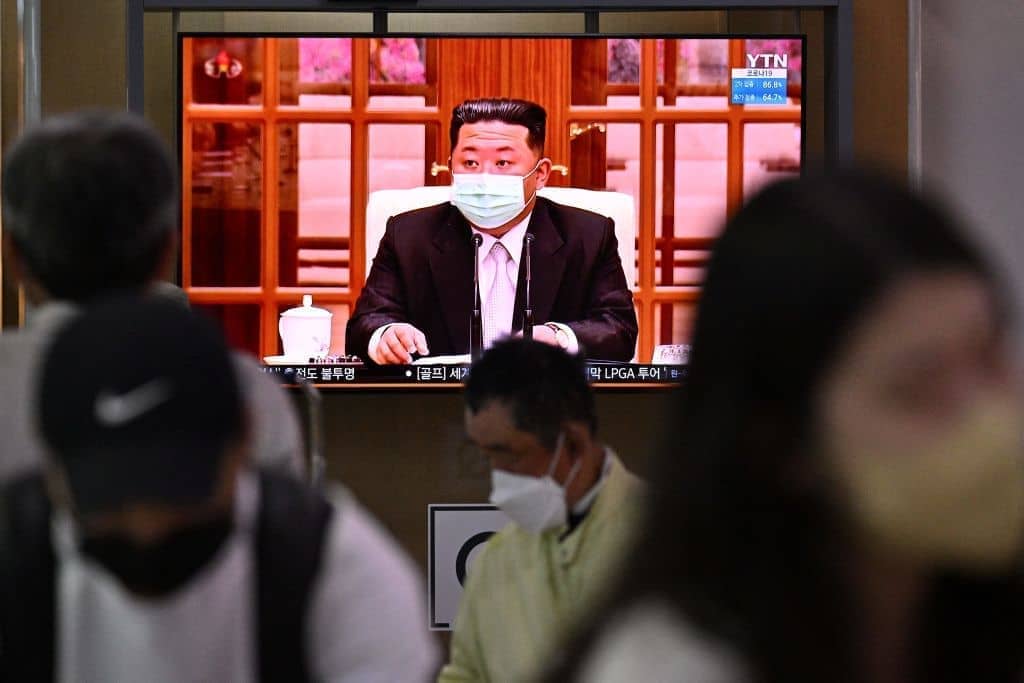As Covid spread throughout the world in 2020, North Korea slammed shut its borders. It was an approach that has paid off, until now. No longer Covid-free, the country’s state media has admitted that cases – and deaths – are exploding. Since April, over 1.2 million cases of a ‘fever’ – a euphemism for coronavirus – have been detected. North Korea’s dictator Kim Jong-un has said the arrival of the pandemic is a ‘great turmoil’.
Hundreds of thousands of cases – and 19 deaths – were reported yesterday alone in North Korea. In a country that prizes secrecy above all else, the true toll is likely to be even higher. But if North Korea is struggling to draw up a response, the country’s president is clear about one thing: who’s to blame. Kim has pointed the finger for the unfolding disaster at the infected, citing ‘careless’ drug use and a lack of awareness of how to treat the ‘fever’. Authorities have now called on North Koreans to gargle salt water and drink willow leaf tea three times a day in a desperate bid to stem the flow of cases. Yet when it comes to recommending vaccines, the North seems reluctant to seek help.
Very few, if any, of the North’s population of nearly 26 million have been vaccinated
Very few, if any, of the North’s population of nearly 26 million have been vaccinated. For all the regime’s emphasis on controlling the disease, it has shunned international offers of vaccines, turning away two million doses of AstraZeneca vaccines from the Covax scheme run by the United Nations; three million doses of Sinovac, from China, have also been rejected. The regime said it did so because of concerns about side effects; the real reason appears to be over the foreign organisations, workers, and experts who would come to North Korea to distribute vaccines, especially given the necessity of multiple dosages over time.
South Korean president, Yoon Seok-yeol, has offered vaccines to the North; only the ruling regime in Pyongyang can decide whether to accept his offer. That seems unlikely, but even if it does, the North’s primitive healthcare infrastructure, lack of available rudimentary medication and limited testing capability all mean this crisis is set to worsen quickly.
The previously mask-averse Kim Jong-un has now been seen wearing a surgical mask during meetings with officials. Has Kim been jabbed? Rumours abound over whether some North Korean elites – including Kim – were vaccinated in 2021. Adopting the perverse strategy of vaccinating elites at the expense of the rest will cause untold damage among a population with little to no immunity to coronavirus. But crucially for Kim it will achieve one thing: maintaining elite loyalty.
North Korea’s enforced isolation over the last two years – which has proved disastrous for its economy and population – now appears to have been in vain. The country faced nationwide food shortages when it shut up shop in January 2020; drought and poor agricultural practices have made matters worse in the time since. Ironically, Kim Jong-un encouraged officials to follow the ‘successes and examples’ of China. But as China’s zero-Covid policy falls apart, so, too is North Korea’s similar strategy.
Kim has imposed ‘maximum emergency’ virus controls, yet he remains distracted by his usual hobby horse: obtaining nukes. Satellite imagery shows activity at the North’s Punggye-ri nuclear test site – supposedly dismantled in May 2018 – alluding to the possibility of a seventh nuclear test, the last of which took place in 2017.
As Covid ravages, the regime would be wise to direct its energies towards combating the virus’s spread, and pausing its nuclear ambitions. But Kim Jong-un’s desire to be recognised as a nuclear state, at the expense of his long-suffering people, means that the pandemic is never likely to be his sole focus. When it comes to North Korea’s Covid catastrophe, the worst may be yet to come.






Comments